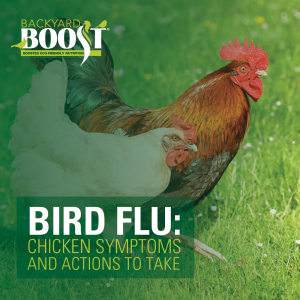
Heat A Chicken Coop
Old Man Winter is coming, and he is a chicken predator many bird owners don’t often think about. However, did you know that chickens are surprisingly hardy birds, depending on the breed. Yet, they still need some help staying cozy when temperatures drop.
When we need to get warm, we can just add another layer or put another log on the fire. Chickens don’t have that luxury. You must be careful when you heat a chicken coop because the last thing you want to do is cause discomfort for your birds, or even worse, start a fire.
Backyard Boost® is here to help! The chicken caretakers on our team have created an effective guide about how to heat a chicken coop safely, ensuring your flock remains healthy and productive. Get your Backyard Boost supplements online today.
How To Heat a Chicken Coop in Winter
Chickens can tolerate cold weather better than you might think. Their feathers provide natural insulation, and they can generate body heat by clustering together. However, extreme cold can lead to frostbite, stress and reduced egg production. That’s why it’s important to take steps to keep your coop cozy in the winter months.
Knowing that it’s crucial to take steps to maintain a stable, warm environment, what should you do? Well, that’s going to vary depending on your coop. That’s why it’s important to understand how to heat a chicken coop—it’s got to be worth your time, energy and money.
Here are 7 ways to keep your backyard birds cozy, including some safe options for how to heat a chicken coop in winter.
1. Insulate the Coop
Proper insulation reduces the need for external heating by trapping heat inside the coop. Use foam boards, straw bales or plywood to insulate walls and ceilings. Be sure to cover any drafts but allow ventilation to prevent moisture buildup. Letting moisture into your coop will actually make the coop damp, which causes the coop to get colder. Think about how cold you are in a more humid climate. The same holds true for a coop that has moisture inside of it.
Walls & Roof
Insulate the walls and roof with materials like foam boards, fiberglass or even recycled materials like old blankets or straw bales.
Windows & Vents
Seal any gaps and cracks to prevent drafts. However, make sure to allow for proper ventilation. This will mitigate moisture buildup, which can lead to respiratory issues.
2. Deep Litter Method
The deep litter method is an excellent way to provide natural heating. This involves allowing bedding material, such as straw or wood shavings, to accumulate and compost on the coop floor. The decomposing bedding generates heat, helping to keep the coop warm. This technique also provides a soft, warm surface for the chickens.
Getting Started
Start with a thick layer of bedding. Add fresh bedding on top regularly, allowing the lower layers to break down with bird droppings. Turn the bedding occasionally to promote decomposition and prevent compaction. Most chicken owners will turn the compost weekly to before adding fresh bedding on top for the chickens to nest into.
3. Safe Radiant Heat Panels
Radiant heat panels are a safer option than heat lamps when you are trying to heat a chicken coop. They emit a low level of heat without the fire risk that comes with traditional heat lamps. These can be mounted on the coop walls, providing gentle warmth. They provide gentle, consistent warmth without making it too hot for your hens.
4. Heat Mats or Flat Panel Heaters
Heat mats designed for chickens or flat panel heaters offer a low-wattage, safe heating option. They are energy-efficient and reduce the risk of fire, as they also do not get too hot. Place them under roosts where chickens gather. Once again, these are a safer option than traditional heat lamps, which are a fire hazard, especially around bedding and feathers.
5. Heated Waterer
If you’re curious how to heat a chicken coop, one of the most efficient ways is to keep your birds hydrated. Regular hydration is essential for your birds’ body warmth. So, while not directly designed to heat a chicken coop, keeping water from freezing helps ensure your chickens stay hydrated and warm. Use a heated waterer to prevent the water from freezing, and be sure to change the water daily, as chickens prefer fresh, clean water.
6. Draft Protection
Even with good insulation, drafts can cause significant heat loss. Here are some tips to protect against drafts as you heat a chicken coop in in the cold months.
Draft Guards
Install draft guards or curtains around the roosting areas to create a barrier against cold air.
Door Seals
Ensure the coop door closes tightly and consider adding weatherstripping to prevent cold air from entering.
7. Supplement their Diet
Diet plays a role in helping chickens stay warm from the inside. Although carbohydrates make up the bulk of the chicken diet, it is advisable to increase their carb load during winter. Carbs are a great energy source and help generate body heat. Cracked corn before bedtime can give chickens an energy boost and help them stay warm through the night.
If you’re not sure your bird’s diet is working, Backyard Boost offers supplements to keep them healthy and happy.
Backyard Boost Can Help
If you’re looking to supplement your flock’s diet during winter, Backyard Boost can help. We offer Backyard Boost Defense, a liquid supplement for poultry designed to support digestion and healthy immune response.
If your chicken is struggling with the stress of winter cold, Defense promotes water intake and hydration and provides nutrients needed in times of stress. It is powered by AO-Biotics® Amaferm®, a prebiotic research proven to enhance nutrient intake in your animals. The better fed they are, the healthier they are. And a healthy chicken will have a much better time braving those winter chills.
Add Backyard Boost Defense to your chickens’ clean, fresh water daily to help them stay comfortable, bounce back from stress and keep them laying.
Winter-Hardy Breeds
You can heat a chicken coop all you want, or you can simply start with some more cold-tolerant chicken breeds. We mentioned at the beginning of this blog that some chickens are just hardier than others.
If you are looking for some cold-tolerant chickens, consider breeds that are full of feathers and those with smaller combs and wattles. These smaller combs and wattles make the birds less susceptible to frost bite.
Also, if you are wanting to keep you egg production up during the winter months, you will want to consider the chicken breeds that are consistent layers.
Winter-hardy Breeds:
The Final Word
No matter what you decide with regard to how to heat a chicken coop for your birds, it’s important to stay alert. Regularly check your chickens for signs of cold stress. Look for symptoms such as lethargy, pale combs or reduced egg production. Address any issues promptly to maintain the health and well-being of your flock. If you are not sure what is wrong with your chick-friend, consult your veterinarian or another seasoned chicken breeder. It is important to quarantine a sick chicken from the rest of the flock, as not to spread any sickness throughout the coop.
Keeping your feathered friends well-nourished and hydrated is key, year-round, but it is especially important as the days grow shorter. That is why we are so passionate about sharing our boosted, eco-friendly nutrition, Backyard Boost with you.
It is also important to ensure that they have proper bedding, a well-ventilated coop and a coop that is properly and safely heated. We cannot stress how important safely heating your coop is, and the dangers that exposed heat lamp bulbs can pose. That’s why we offered these alternative tips and advice on how to heat a chicken coop.
Our motto is care that comes full circle—we want your feathered friends to be safe AND warm because we care about their, and your, wellbeing. We know that safety starts with the way you heat your coop. Keeping your birds warm and cozy is important but keeping them warm and safe is even more important.
Get your Backyard Boost Today!
Now that you know how to heat a chicken coop carefully for your flock, it’s time to give them nutrition from Backyard Boost!
Not only do we offer Backyard Boost®® Defense, for times of stress, but we also offer a daily supplement, Backyard Boost® Daily Essentials. Daily Essentials is a pelleted protein supplement for poultry designed to maximize digestibility and egg production. It contains AO-Biotics Amaferm®, a prebiotic research-proven to enhance digestibility and AO-Biotics® EQE, a postbiotic research-proven to enhance egg quality. Daily Essentials also provides nutrients needed for overall well-being.
Ordering Backyard Boost is simple: purchase via our online store or from one of our online retail partners.
Perhaps you prefer to shop in person. You can use our dealer locator to find a BioZyme dealer closest to you.
Stay In the Know
Do you want to know more about taking care of your backyard birds in the winter or in any season? Use our Chicken Care Cycle as your guide to all knowledge of backyard chickens. Or you can simply sign up for our regular electronic newsletter to stay current on our blogs and other education.

